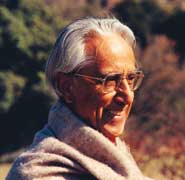




Mythos-Logos
“Mythos and logos go together, but their relationship is neither dialectic nor mythic; it is rather a mutually constitutive relationship. If it were logical, the spirit would be drowned in the logos. Were it mythical, the logos would be reduced to the spirit. Put another way, there is no logos without mythos – of which the logos is language – and there is no mythos without logos – of which the myth is the foundation … Only the pratîtyasamutpâda, the radical relativity of all that is, can maintain the harmony without domination between the mythos and the logos” (Intellectual autobiography”).
The reunion between mythos and logos is one that must also take place between subjectivity and objectivity, between the heart and mind, between rational thought and the spirit that flies free. This reunion is necessary so as to avoid falling either into the ancient submission to myth or into the submission of myth to logos, namely, falling into the present day logo-monism: “Reality is not given to us as logos, but rather offers itself to us as mythos, as that horizon against which we place our own idea of the world… Our world is given to us in mythos, and that world, equally ours, is discovered by the logos” (Pensamiento científico y pensamiento cristiano, Madrid 1994). Panikkar describes this double faceted reality as follows:
“Myth is not the object of discourse, but the expression of a kind of sui generis awareness. Myth and knowledge go together... A living myth does not leave room for interpretation, inasmuch as there is no need for an intermediary. The hermeneutic of a myth is in no way myth, but rather its logos … The myth is transparent like light, and the mythic story is only the form, the covering with which the myth finds itself expressed, concealed, illuminated. This does not at all mean we have to disregard, much less belittle, the value of thinking and ignore the realm and inviolable rights of the logos. I simply mean that man cannot be reduced to the logos, nor can awareness be reduced to reflexive consciousness” (Myth, Faith and Hermeneutics).
The theme of myth and its place in relation to religion and human thinking in general has greatly occupied Panikkar and has given rise to the publication of numerous works of his. He himself came to say, “It is necessary to rediscover the place and function of myth in human life and to situate rationality in the total human context.” (Blessed Simplicity).
An open dialogue between myth and logos is the foundation of his dialogical dialogue as the force for opening oneself to the other and respectfully entering into his reality.
official site